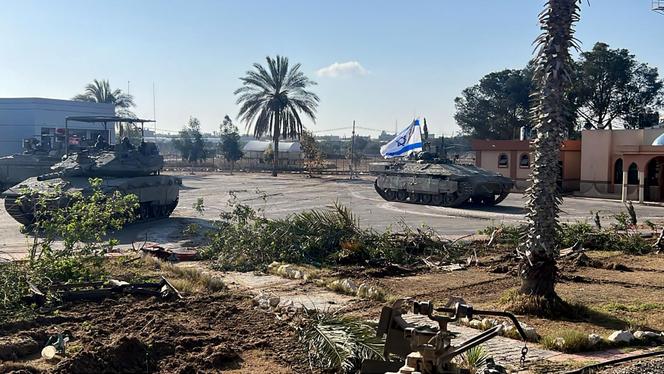


After Israel launched an assault on Rafah on Monday, May 6, the military claimed to have taken control of the Gaza side of the Rafah crossing, a symbolic and crucial site for 2 million Palestinians as it's the only border crossing between the enclave and Egypt. Footage was shared of Israeli flags being raised along the Salah al-Din road, the capture of which marks a new stage in the Israeli military's siege of the Gaza Strip.
The sudden breakthrough came just a few hours after Hamas announced that it had accepted an Israeli ceasefire proposal on Monday, but not without significant changes. Changes that Israel considered unacceptable. The army has presented its operation in Rafah as limited and not as the start of a conquest of the city, in the south of the Strip and the only town not yet to have been taken over by Israel's troops. Over a million people have taken refuge there after fleeing the bombardments.
Palestinian sources had earlier reported Israeli military movement from the Netzarim Corridor, where the military had an advanced position in the center of the territory. A medical source told Le Monde that they saw tanks near the European hospital in Khan Yunis in the south of Gaza early on Monday. International hospital staff were evacuated. The army also shelled around 100 targets in the Rafah area, according to army radio broadcasts, including in the western district of Tell es-Sultan.
By Monday evening, the Israeli war cabinet had unanimously decided to continue its operations in Rafah after three months of almost daily threats. It remains to be seen whether this move signals Israel's abandonment of the latest round of ongoing talks with Hamas, while the latter has warned, as have Qatari and Egyptian mediators, that an invasion of Rafah would derail these efforts. Prime Minister Benjamin Netanyahu's office said Monday evening that his government, for its part, intended to continue negotiations and would send a delegation to Egypt "in an effort to maximize the possibility of reaching an agreement on terms acceptable to Israel."
Since Saturday, Netanyahu has been accused of trying to derail talks, under pressure from his far-right allies, who are pushing for an endless continuation of the war and the ethnic cleansing of Gaza. Centrist politician Benny Gantz displayed a united front with the head of government on Monday evening. The retired army general, who is one of the war cabinet's most active advocates of a ceasefire agreement to free Israeli hostages taken by Hamas, clarified that "the military action in Rafah is also an inseparable part of our continued efforts and commitment to return our hostages and change the security reality in the south. We will continue all efforts until we bring them home."
You have 56.39% of this article left to read. The rest is for subscribers only.
